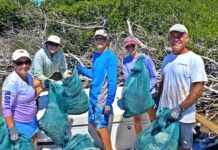A budget proposal unveiled by Gov. Ron DeSantis last week showed $4.3 billion more in spending, with $2.6 billion accounting for costs of the state’s COVID-19 pandemic response and hits to the economy and families.
Allocations for key environmental projects were included with the governor’s spending plan, as well as $1 billion to deal with sea level rise and funds for teacher salary raises.
Standing inside the Florida State Capitol, DeSantis said his “Florida Leads” budget places $6.6 billion in total reserves, which is more than 6% of the total budget. He said that leaves ample resources for unforeseen expenditures related to the COVID-19 pandemic and the hurricane season that begins June 1.
DeSantis said a proposed budget increase comes following several actions taken last year, which included the vetoing of roughly $1 billion in the state’s $93.2 billion budget last year to prepare for unknowns related to the pandemic. In addition, he said the state maximized $4.5 billion in federal funding for the pandemic.
State agencies were also asked to set aside 6% of their budgets to give financial flexibility, and that amounted to $800 million to deal with pandemic expenses.
DeSantis’ remarks also honed in on actions to keep Florida open, which he said resulted in a $2.1 billion increase in revenue since a worst-case revenue scenario was released in August.
“We didn’t need to dip into the budget stabilization fund or reserve funds to stay afloat,” he said. “In December, revenues exceeded the estimate by over $300 million. We expect in January to see at least $100 million more than what was forecast.”
DeSantis said his budget remains committed to providing the best education experience while building on pay raises for teachers. Around $550 million is included to continue raising the minimum K-12 teacher salary to $47,500, as well as salaries of other instructional personnel.
A total of $110 million aims to address student mental health through the pandemic. Other investments include $10 million in the Work Florida Student Success Incentive Fund, as well as $10 million for the Pathways to Career Opportunities grant program and nearly $510 million in funding to support workforce education programs.
“There’s going to be things that are not funded 100%. It’s just going to be a tough budget session.”
— State Rep. Jim Mooney
As for the environment, $473 million is proposed for Everglades restoration, $145 million for water quality improvements and $25 million to combat harmful algal blooms and red tide.
“This is a priority. It’s something that we have to continue momentum and it’s something our budget shows commitment to doing,” he said.
DeSantis’ budget also addresses sea level rise through the establishment of a $1 billion, four-year Resilient Florida program. State and local governments would receive grants to fund projects to address impacts of intensified storms and localized flooding.
“We believe this makes a lot of economic sense when you look at how an insurance market would view property insurance and to see how Florida is leading in trying to get ahead of these impacts. We think it’s a smart thing to do,” he said.
The budget proposal also includes more than $31 million for adults and children who suffer from mental illness and emotional disturbances; $50 million for VIsit Florida’s marketing programs; and $9.47 billion for the State Transportation Work Program for new highway construction, bridge repairs, and seaport, aviation and transit program improvements.
New state Rep. Jim Mooney acknowledged that sticking to DeSantis’ budget would be “wonderful.” However, Mooney said some budget items and appropriations won’t see forward movement this year.
“At the end of the day, you can follow whatever kind of budget you want, but the reality is it still has to come out balanced,” he said. “There’s going to be things that are not funded 100%. It’s just going to be a tough budget session.”
Several appropriation bills sponsored by Mooney are seeing movement in committee, including House Bill 2147 that requests $200,000 for Monroe County’s Baker Act public receiving facility that provides psychiatric care 24/7. According to the bill, which sits in the Health Care Appropriations Subcommittee, the facility requires modernized security upgrades to safely care for the increasing severity of illness/violence among a higher number of clients.
Three other appropriation bills by Mooney await consideration in the Infrastructure and Tourism Appropriations Subcommittee. Requests include $750,000 for construction of 20 affordable housing units on two sites in the Upper Keys by Habitat for Humanity; $250,000 for repairs at the Truman Little White House; and just over $994,000 to harden the Florida Keys Aqueduct Authority’s standby power system to ensure potable and sanitary water is sent to residents and visitors of the island chain during emergencies.
“In December, we saw revenues exceed the estimate by over $300 million. We expect in January to see at least $100 million more than what was forecast.”
— Gov. Ron DeSantis.
Monroe county commissioners and Mayor Michelle Coldiron expressed their appreciation for a budget proposal that includes funding for the Florida Keys Stewardship Act, which was slashed last year as part of the governor’s vetoes. Funds from the stewardship act go to water quality projects.
“We look forward to working with the governor’s office and the Florida legislature to see these significant funds in the governor’s budget are included in the state’s final budget,” Coldiron said.
Legislative session in Tallahassee starts March 2.

























